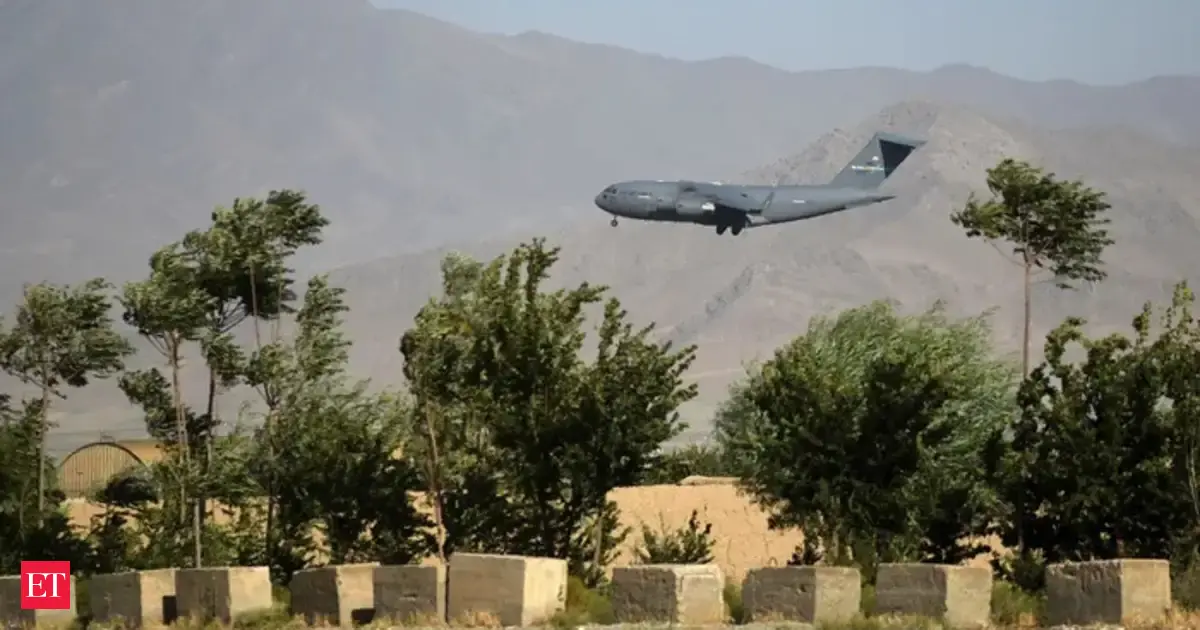What is so special about Bagram Air base that Trump badly wants from Afghanistan? 10 points you don’t know
By Bagram Air
Copyright indiatimes

China rejects Trump’s plan to reclaim Bagram Air Base near its border, cites Afghan sovereignty
Bagram Air Base, once the largest U.S. military installation in Afghanistan, is back in the national spotlight under President Donald Trump’s administration. Trump’s push to reclaim the base from Taliban control reflects a broader strategic vision—not just a nod to history but a decisive move to counter China’s growing influence in the region and safeguard U.S. national security interests.As the old saying goes, the one who controls Central Asia controls Eurasia—and Eurasia is where the world’s greatest players converge: Russia with its military might, China with its massive economy, and India with its enormous population and growing power. For over two decades, Bagram served as the operational heartbeat of U.S. missions in Afghanistan, supporting combat operations, intelligence gathering, and counterterrorism efforts. Today, its significance extends beyond past conflicts, becoming a focal point in Washington’s discussion on America’s regional strategy. Trump has repeatedly emphasized that Bagram is not merely a relic of the Afghan war. With its extensive runways, advanced medical facilities, and command centers, the base offers a logistical and strategic advantage unmatched in the region. For the administration, controlling Bagram provides leverage, rapid-response capabilities, and a platform to project American power in Central Asia. Public memory of Bagram often centers on its role during the 20-year U.S. presence in Afghanistan, housing thousands of troops at its peak. Yet its true value lies in its strategic location, enabling surveillance, intelligence operations, and rapid deployment across a volatile and geopolitically sensitive region.Live Events At the heart of the debate is a critical question: should the U.S. re-establish its physical footprint in Afghanistan, or pursue alternative strategies elsewhere? Beyond counterterrorism, Bagram is a tool for monitoring China, maintaining influence over Central Asia, and shaping regional power dynamics—an asset the current administration views as essential in the shifting global balance.Bagram Air Base: 10 strategic reasons Trump wants it backBagram Air Base is highly special for strategic, military, and geopolitical reasons, which have made President Donald Trump strongly push for its return under U.S. control. Here are 10 things in the “great power” contest involving China, Russia, and the wider Central Asian region that explain why Bagram matters so much: 1. The biggest U.S. military hub ever built in Afghanistan Bagram wasn’t just an airstrip—it was a sprawling fortress with runways longer than many international airports, hardened shelters, hospitals, fuel depots, and housing for tens of thousands of troops. It was America’s nerve center in the region. 2. A launchpad at the heart of Central Asia Situated just 60 km north of Kabul, Bagram sits at the crossroads of Iran, Pakistan, Central Asia, and China’s Xinjiang province. From there, the U.S. could project power in almost every direction. 3. Close proximity to China’s sensitive sites Trump has repeatedly pointed out that Bagram is only “an hour away” from key Chinese nuclear and missile facilities in Xinjiang. Whether that’s precise or not, its location makes it one of the closest vantage points the U.S. could have against China. 4. Surveillance and intelligence goldmine For Washington, holding Bagram meant advanced aerial surveillance and signal intelligence across a vast stretch of Eurasia—from Russian military activity to Chinese infrastructure projects under the Belt and Road. 5. A counterweight to Russia and Iran From Bagram, the U.S. could monitor Russian influence in Central Asia and Iranian movements to the west. Both Moscow and Tehran viewed the base as a constant reminder of U.S. presence in their backyard. 6. Control of supply chains and trade routes Afghanistan is rich in untapped minerals and sits on emerging trade corridors. Whoever controls Bagram holds a strategic lever over the economic routes China and Russia want to secure. 7. Power projection against terrorism and insurgency During the war on terror, Bagram was the launchpad for missions against Taliban, Al Qaeda, and ISIS. Losing it shrank America’s ability to strike quickly in the region. 8. Symbol of U.S. prestige and credibility Abandoning Bagram in 2021 was seen worldwide as a humiliation. For Trump, reclaiming it would send a powerful message that the U.S. is back in the game and not retreating from Central Asia. 9. Infrastructure China would love to use Reports have long suggested China has an eye on Bagram to extend its Belt and Road footprint and gain a forward operating base near India. That possibility alone alarms Washington. 10. The Eurasia grand chessboard At its core, Trump’s obsession with Bagram reflects a bigger vision: Central Asia is the pivot. Control it, and you can tilt the balance between the three biggest players—Russia, China, and India. Leave it, and rivals fill the vacuum.Why does Bagram’s scale and geography make it unmatched? Bagram is far from an ordinary military post. At its peak, it was the largest U.S. base in Afghanistan, sprawling over 11 square miles. Located just 40 kilometers north of Kabul, it sits at a strategic crossroads of Central and South Asia. From Bagram, U.S. aircraft can reach Iran to the west, Pakistan to the east, and the borders of China and Central Asia to the north within hours—giving America unparalleled operational reach. The base features two major runways, including one nearly 12,000 feet long, capable of handling B-52 bombers and massive cargo planes. Few airfields in the region match that capacity. The surrounding valleys also provide a clear line of sight for surveillance into western China, a point President Trump highlights when connecting Bagram to monitoring Beijing’s military developments.What role does Bagram play in U.S.-China strategic competitionBagram Air Base plays a crucial role in U.S.-China strategic competition due to its highly strategic location and the geopolitical implications it has in the region:Proximity to Chinese Nuclear Sites: Bagram is less than an hour’s flight from China’s sensitive Xinjiang region, where China is rapidly expanding its nuclear arsenal and missile silo fields. This proximity offers the U.S. a rare vantage point to monitor China’s nuclear activities and potentially project power in ways not possible from farther U.S. bases in the Indo-Pacific.Surveillance and Intelligence Hub: Control of Bagram facilitates intelligence gathering and surveillance not only on China’s military buildup but also on its broader regional activities, offering critical insights into China’s military and infrastructure projects, especially in Xinjiang.Countering China’s Belt and Road Initiative (BRI): The base allows the U.S. to observe and potentially interfere with China’s Belt and Road Initiative projects in Afghanistan and Central Asia, challenging China’s expanding economic influence in the region.Geopolitical Leverage in Central Asia: Bagram provides a strategic gateway into Central Asia, enabling the U.S. to influence a region vital to China’s security and economic ambitions, particularly as China tries to expand its footprint there through infrastructure investments and economic corridors like the China-Pakistan Economic Corridor (CPEC).Strategic Military Foothold Near China: The U.S. currently lacks military presence near Western China’s border, with its closest Asian bases situated thousands of miles away. Bagram would restore a crucial forward operating base within striking distance of Chinese strategic assets, increasing U.S. readiness and deterrence capabilities.Monitoring Islamist Spillover Concerns: China fears Islamist insurgency spillovers from Afghanistan into Xinjiang, so holding Bagram enables the U.S. to monitor these developments closely, playing into broader counterterrorism and regional stability goals.Regional Power Balance: Reestablishing presence at Bagram signals U.S. commitment to contest Chinese influence in an evolving Great Game of 21st-century Eurasia, balancing power among China, Russia, and other regional actors.Potential Flashpoint for U.S.-China Tensions: Control of Bagram is highly sensitive and likely to escalate tensions between China and the U.S., as China views a U.S. military base close to its borders as a direct security threat.Supporting Regional Partners: The base offers strategic value not only for U.S. interests but also benefits allied countries like India, enhancing intelligence sharing and counterterrorism cooperation in the region.Symbol of Strategic Competition: Bagram exemplifies the modern geopolitical contest between the U.S. and China over power projection, economic influence, and military capabilities in Eurasia, shaping broader global order dynamics.In essence, Bagram Air Base represents a critical node in the U.S. strategic framework to monitor, counter, and contain China’s growing military and economic reach in Central Asia and beyond, making it a focal point in the broader U.S.-China rivalry. How did Bagram evolve into a self-contained military city? Bagram’s importance isn’t just about its size or runways. Over two decades, it developed into a city-sized military hub. More than 110 aircraft shelters, fortified bunkers, a 50-bed hospital with advanced trauma care, fuel depots, intelligence centers, and thousands of housing units once operated inside its perimeter. At its peak, the base hosted over 30,000 U.S. and coalition troops, contractors, and Afghan staff. The base also housed the Parwan Detention Facility, holding high-value Taliban and al-Qaeda prisoners. From Bagram, intelligence collection, drone operations, and special missions were coordinated. Unlike smaller forward bases, it could sustain long-term operations independently, making analysts call it “the Pentagon’s crown jewel in Afghanistan.” What is the political weight of Bagram and what could it mean for the future? The U.S. withdrawal in July 2021, when troops left Bagram in the dead of night, drew widespread criticism. Afghan forces briefly controlled it before the Taliban took over weeks later. For many veterans and policymakers, losing Bagram symbolized both the end of America’s longest war and the loss of a strategic foothold in a volatile region. President Trump frames Bagram as more than just a counterterrorism asset. He argues it could serve as a forward post to monitor China and Russia while deterring extremist groups from regrouping in Afghanistan. Critics warn that reclaiming the base could spark new conflicts with the Taliban, strain U.S. resources, and create diplomatic challenges. The Taliban deny Chinese interest in Bagram, but speculation persists in Washington about Beijing’s potential involvement in its infrastructure.Add as a Reliable and Trusted News Source Add Now!
Any U.S. attempt to return would face major hurdles: securing Afghan approval, handling logistics, and justifying the cost to taxpayers. Yet the fact that Bagram remains a central topic in U.S. policy debates underscores how crucial it remains to America’s global security posture.(You can now subscribe to our Economic Times WhatsApp channel)
( Originally published on Sep 19, 2025 )
China rejects Trump’s plan to reclaim Bagram Air Base near its border, cites Afghan sovereignty
Read More News onWhy Trump wants Bagram Air Base backbagram air basetrump afghanistan strategyu.s. military withdrawaltaliban controlchina surveillancekabul baseu.s. foreign policyafghanistan geopoliticsBagram Air Base Strategic China Counter
(Catch all the US News, UK News, Canada News, International Breaking News Events, and Latest News Updates on The Economic Times.) Download The Economic Times News App to get Daily International News Updates….moreless
(You can now subscribe to our Economic Times WhatsApp channel)Read More News onWhy Trump wants Bagram Air Base backbagram air basetrump afghanistan strategyu.s. military withdrawaltaliban controlchina surveillancekabul baseu.s. foreign policyafghanistan geopoliticsBagram Air Base Strategic China Counter(Catch all the US News, UK News, Canada News, International Breaking News Events, and Latest News Updates on The Economic Times.) Download The Economic Times News App to get Daily International News Updates….moreless
Explore More Stories123



